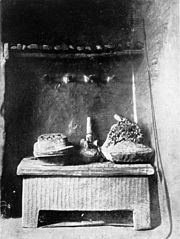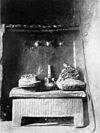Kami are the deities, divinities, spirits, mythological, spiritual, or natural phenomena, or holy powers that are venerated in the Shinto religion. They can be elements of the landscape, forces of nature, beings and the qualities that these beings express, and/or the spirits of venerated dead people. Many kami are considered the ancient ancestors of entire clans. Traditionally, great leaders like the Emperor could be or became kami.

Odinani or Odinala, also known as Omenala, Omenana, Odinana, Ọmenani, Ọdịlalị, or Ọdịlala, are the traditional cultural beliefs and practices of the Igbo people of south east Nigeria. These terms, as used here in the Igbo language, are synonymous with the traditional Igbo "religious system" which was not considered separate from the social norms of ancient or traditional Igbo societies. Theocratic in nature, spirituality played a huge role in their everyday lives. Although it has largely been supplanted by Christianity, the indigenous belief system remains in strong effect among the rural and village populations of the Igbo, where it has at times influenced the colonial religions. Odinani is a pantheistic and polytheistic faith, having a strong central deity at its head. All things spring from this deity. Although a pantheon of other gods and spirits, these being Ala, Amadiọha, Anyanwụ, Ekwensu, Ikenga, exists in the belief system, as it does in many other Traditional African religions, the lesser deities prevalent in Odinani serve as helpers or elements of Chukwu, the central deity.

Egungun, in the broadest sense is any Yoruba masquerade or masked, costumed figure. More specifically, it is a Yoruba masquerade for ancestor reverence, or the ancestors themselves as a collective force. Eégún is the reduced form of the word egúngún and has the same meaning. There is a misconception that Egun or Eegun is the singular form, or that it represents the ancestors while egúngún is the masquerade or the plural form. This misconception is common in the Americas by Orisa devotees that do not speak Yorùbá language as a vernacular. Egungun is a visible manifestation of the spirits of departed ancestors who periodically revisit the human community for remembrance, celebration, and blessings.

The Inca religion was a group of beliefs and rites that were related to a mythological system evolving from pre-Inca times to Inca Empire. Faith in the Tawantinsuyu was manifested in every aspect of his life, work, festivities, ceremonies, etc. They were polytheists and there were local, regional and pan-regional divinities.
In Igbo mythology, Ahia Njoku, also known as Ifejioku, Aha Njoku, is a goddess worshipped by the Igbo people of Nigeria.
Ala is the female Alusi (deity) of the earth, morality, fertility, and creativity in Odinani. In Odinani, Ala rules over the underworld and holds the deceased ancestors in her womb. Her name literally translates to "ground" in the Igbo language, denoting her powers over the earth and her status as the ground itself. Ala is considered the highest Alusi in the Igbo pantheon. Ala's husband is Amadioha, the sky deity.

The traditional beliefs and practices of African people are highly diverse, including various ethnic religions. Generally, these traditions are oral rather than scriptural and are passed down from one generation to another through folk tales, songs, and festivals, and include beliefs in spirits and higher and lower gods, sometimes including a supreme being, as well as the veneration of the dead, and use of magic and traditional African medicine. Most religions can be described as animistic with various polytheistic and pantheistic aspects. The role of humanity is generally seen as one of harmonizing nature with the supernatural.
Ekwensu is a trickster of the Igbo people, a trickster spirit of confusion, that serves as the Alusi (god) of bargains and the tortoise. Crafty at trade and negotiations. He is often invoked for guidance in difficult mercantile situations. He is perceived as a spirit of violence that incites people to perform violent acts. His companion was Ogbunabali.
Ikenga is a horned Alusi found among the Igbo people in southeastern Nigeria. It is one of the most powerful symbols of the Igbo people and the most common cultural artifact. Ikenga is mostly maintained, kept or owned by men and occasionally by women of high reputation and integrity in the society. It comprises someone's Chi, his Ndichie (ancestors), aka Ikenga, ike (power) as well as spiritual activation through prayer and sacrifice.
Agwu Nsi is the Arusi of divination.
Igbo culture are the customs, practices and traditions of the Igbo people of southeastern Nigeria. It consists of ancient practices as well as new concepts added into the Igbo culture either by cultural evolution or by outside influence. These customs and traditions include the Igbo people's visual art, music and dance forms, as well as their attire, cuisine and language dialects. Because of their various subgroups, the variety of their culture is heightened further.
The Igbo calendar is the traditional calendar system of the Igbo people from present-day Nigeria. The calendar has 13 months in a year (afo), 7 weeks in a month (onwa), and 4 days of Igbo market days in a week (izu) plus an extra day at the end of the year, in the last month. The name of these months was reported by Onwuejeogwu (1981).
Amadioha is the Arusi or Agbara of thunder and lightning of the Igbo people of southeastern Nigeria. He is amongst the most popular of Igbo deities and in some parts of Igboland, he is referred to as Amadiora, Kamalu, Kamanu, or Ofufe. Astrologically, his governing planet is the Sun. His color is red, and his symbol is a white ram. Metaphysically, Amadioha represents the collective will of the people. He is often associated with Anyanwu, who is the Igbo god of the Sun. While Anyanwu is more prominent in northern Igboland, Amadioha is more prominent in the southern part. His day is Eke, which is the first market day of the Igbo four-day week.

Akan religion comprises the traditional beliefs and religious practices of the Akan people of Ghana and eastern Ivory Coast. Akan religion is referred to as Akom. Although most Akan people have identified as Christians since the early 20th century, Akan religion remains practiced by some and is often syncretized with Christianity. The Akan have many subgroups, so the religion varies greatly by region and subgroup. Similar to other traditional religions of West and Central Africa such as West African Vodun, Yoruba religion, or Odinani, Akan cosmology consists of a senior god who generally does not interact with humans and many gods who assist humans.

The Imo River (Igbo:Imo) is located in southeastern Nigeria and flows 240 kilometres (150 mi) into the Atlantic Ocean. In Akwa Ibom State, the river is known as Imoh River, that is, Inyang Imoh, which translates to River of Wealth. Its estuary is around 40 kilometres (25 mi) wide, and the river has an annual discharge of 4 cubic kilometres (1.0 cu mi) with 26,000 hectares of wetland. The Imo's tributary rivers are the Otamiri and Oramirukwa. The Imo was cleared under the British colonial administration of Nigeria in 1907–1908 and 1911; first to Aba and then to Udo near Umuahia.

Bantu religion is the system of beliefs and legends of the Bantu people of Africa. Although Bantu peoples account for several hundred different ethnic groups, there is a high degree of homogeneity in Bantu cultures and customs, just as in Bantu languages. Many Bantu cultures traditionally believed in a supreme god whose name is a variation of Nyambe/Nzambe.
Ndoro is a town in Oboro, Ikwuano Local Government Area of Abia State, Nigeria. It is about 16 km southeast from the state capital, Umuahia and is located along the Umuahia-Ikot Ekpene Road.









